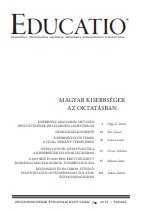Kisebbségi egyetemek a világ néhány térségéb
Minority-Serving Universities in Some Regions of the World
Author(s): Levente SalatSubject(s): Education, Geography, Regional studies, Cultural Anthropology / Ethnology, Higher Education , State/Government and Education, Ethnic Minorities Studies
Published by: Akadémiai Kiadó
Keywords: education; university; minorities; regions;
Summary/Abstract: In the vast literature on the political consequences of ethno-linguistic diversity and means via which to accommodate it, there is relatively limited attention being paid to the participation of ethnic and national minorities in tertiary education; and this has occurred in spite of the fact that several recent sources have raised the issue of the underrepresentation of national minorities in higher education, something which became particularly noticeable within the context of the global expansion of education provided at university level. Postsecondary education, in spite of the various changes it has recently undergone, remains an important area for nation-building – that is, in the educating of properly socialized elites, persons loyal to the dominant way of life of the state. It is thus not surprising that accommodating the needs of national minorities, of people interested in their own cultural survival, is not an easy task. It is no less true, however, that once accepted as a legitimate goal, the cultural reproduction of non-dominant ethno-linguistic communities requires, in the circumstances of today’s global culture, properly trained minority elites, too. The paper explores a particular type of institutional arrangement – minority-serving institutions within higher education – which exist today in several regions of the world; and such institutions have three main common characteristics: education is (in some cases, only partially) provided in the language of the non-dominant community, language re-vitalization being an important outcome; culture-sensitive curricula, allowing for preserving one’s special cultural heritage and giving wider social opportunities to members of marginalized groups; and, thirdly, minority control of the respective institutions – which is a particular form of empowerment, leading to positive examples of self-management and community self-realization. The paper will also reflect on several aspects of the overall political set-up which make such arrangements possible.
Journal: Educatio
- Issue Year: 21/2012
- Issue No: 1
- Page Range: 49-66
- Page Count: 18
- Language: Hungarian

